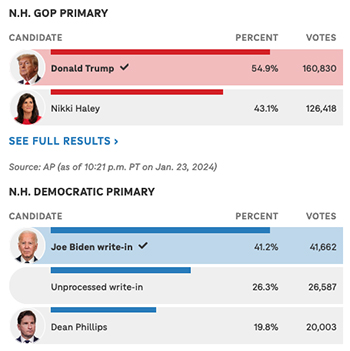By Jim Ellis — Thursday, May 16, 2024
Senate
Maryland: Why Trone Lost — There are specific reasons as to why Maryland Rep. David Trone (D-Potomac) lost to Prince George’s County Executive Angela Alsobrooks (D) by a large margin even with his huge financial advantage. First, as we had been stating in these posts all along, Trone’s exorbitant spending, estimated to be a self-contributed $62 million, which is an all-time record candidate investment for a Senate primary, was placing him ahead in polling but not to the point where he was substantially pulling away from Alsobrooks.In contrast, she had strong grassroots support within the African-American communities in PG County and Baltimore, which is very important in a Maryland Democratic primary and could partially compensate for being outspent. She was also smart about how to spend the money she did have, working the ground early and spending her funds late in the campaign, knowing that she could not equal Trone’s largess.
Additionally, Trone likely became over-saturated to the point people were tuning him out because of over-exposure. His last ads, attacking former Gov. Larry Hogan, also reverberated negatively toward Trone. Though Hogan is a Republican, he generally possesses a positive image among most Democrats.
Furthermore, the Trone campaign strategy appeared misapplied. He attempted to secure the left flank of the party while Alsobrooks was firmly entrenched within the faction. Therefore, he left more centrist Democrats in places like Baltimore County and the Annapolis area with no place to go. The fact that the entire Democratic congressional delegation, with the exception of retiring Sen. Ben Cardin who stayed neutral, and Rep. Dutch Ruppersberger (D-Cockeysville) who supported Trone, along with Gov. Wes Moore, all not backing the congressman also proved damaging to his credibility.
For Trone to win the nomination, he would have needed to carry five of the state’s eight congressional domains, including Districts 1 (Rep. Andy Harris-R), which he did, 2 (Rep. Ruppersberger), which he did not, 3 (retiring Rep. John Sarbanes-D), which he did not, and 8 (Rep. Jamie Raskin-D), which he did not. In the end, he topped Alsobrooks only in the lone Eastern Shore Republican district and his own western Maryland 6th District. Adding the sum of these factors, in addition to making three verbal and strategic gaffes at the end, culminated in what appears to be a 12-point loss even with his approximate 10:1 spending advantage.
House
ND-AL: Tight Primary Unfolding — As part of their statewide polling project, DFM Research (May 6-8; 550 likely North Dakota Republican primary voters; live interview & text) tested the open Republican primary for the state’s at-large US House seat. Three-term incumbent Rep. Kelly Armstrong (R-Bismarck) is running for governor, thus leaving a competitive GOP congressional primary in his wake.
The contest, heading for a June 11 primary election, appears too close to call. The DFM results find former state Rep. Rich Becker leading Public Service Commissioner Julie Fedorchak by a 29-26 percent margin with former Miss America Cara Mund trailing at 14 percent. Thus, between Becker and Fedorchak, the race appears as a toss-up. The plurality primary winner will have the inside track toward winning the seat in November.
Governor
North Dakota: Rep. Armstrong Up in Two Polls — DFM Research and Guidant Polling & Strategy returned Republican primary survey data on the impending North Dakota open governor’s race, which is headed for a June 11 nomination election. Both find Rep. Kelly Armstrong (R-Bismarck) posting major, and almost identical, leads over Lt. Gov. Tammy Miller.
DFM Research (May 6-8; 550 likely North Dakota Republican primary voters; live interview & text) posts Rep. Armstrong to a 56-18 percent advantage. Guidant (May 4-8; 500 likely North Dakota Republican primary voters; live interview & text) sees virtually the same result favoring Armstrong, 60-19 percent. The eventual Republican nominee will be a heavy favorite in the general election to replace retiring Gov. Doug Burgum (R).
States
Virginia: Statewide Gambling & Candidate Polling Results — An organization attempting to defeat a proposed Virginia gambling ballot proposition, Virginians Against Neighborhood Slot Machines, commissioned a joint statewide poll from two major polling organizations, Fabrizio Ward & Associates, a Republican firm, and the Democratic polling group, Impact Research. The pollsters (released May 10; surveyed April 26-28; 500 registered Virginia voters; live interview & text) found wide opposition to the gambling measure (opponents outnumbering supporters by a 20 point margin), and then tested the key statewide contests.
On the candidate front, surprisingly President Joe Biden held only a one-point ballot test lead over former President Donald Trump, 43-32 percent, while Sen. Tim Kaine (D) outpaced retired US Navy captain and 2022 congressional candidate Hung Cao (R) by 12 percentage points, 48-36 percent. If additional research suggests a tightening at the presidential level, Virginia could move into a more competitive political realm in the coming months.







